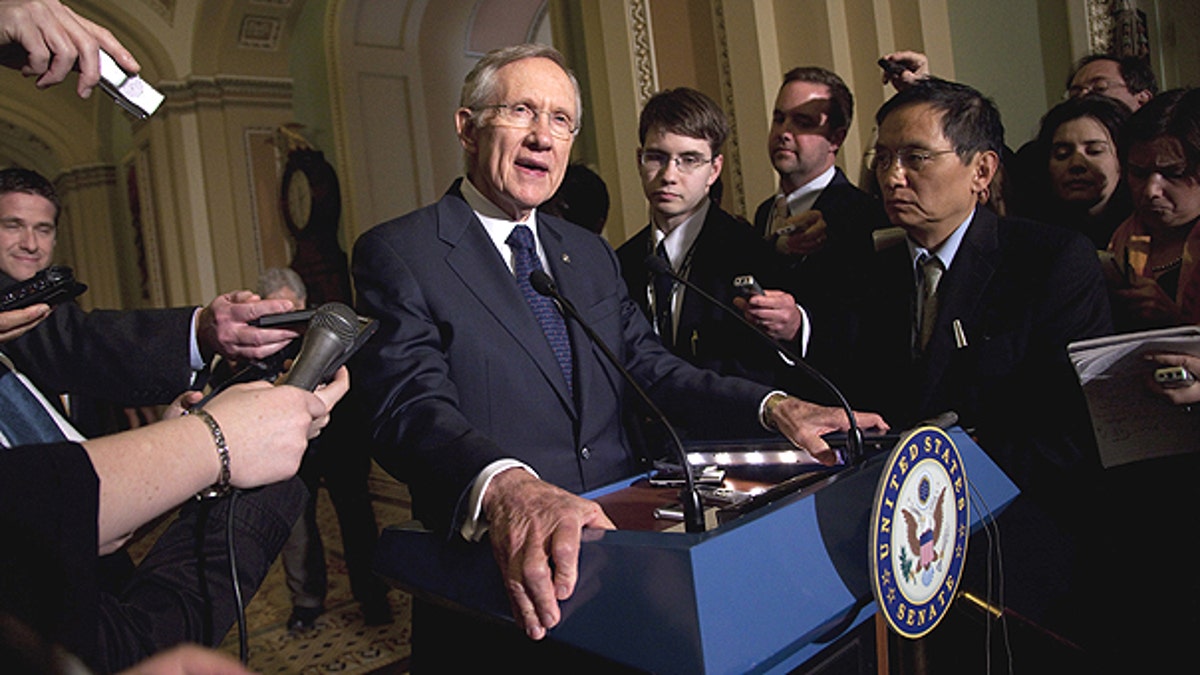
March 1: Senate Majority Leader Sen. Harry Reid, D- Nev., talks to the media after a Democratic policy luncheon in Washington. (AP)
WASHINGTON -- President Obama signed on Wednesday a measure that slices $4 billion from federal spending and keeps the government running for two more weeks.
The Republican-dominated House passed the bill Tuesday and the Democratic-controlled U.S. Senate approved it earlier Wednesday in a 91-9 vote.
Members of both parties, while still far apart on the philosophy and methods of reducing government spending, signed on to the temporary measure to avoid the stigma of having cast a vote that would have shut down the government.
That last happened in 1995 when Bill Clinton was president. He stood his ground in that budget battle against then-House Speaker Newt Gingrich and saw his political fortunes improve dramatically, leading to his re-election to a second term in 1996.
At stake is congressional appropriation of funds for budgeted government spending for the fiscal year ending Sept. 30. Before Democrats lost control of the House in November elections, the party had not used its majority in both houses of Congress to pass appropriations for the full year. Instead the government was funded by temporary spending laws, which expire on Friday.
The Republicans, flexing the muscle of their new majority in the House -- including a huge freshman class that owes allegiance to the tea party -- have already voted to excise $61 billion from government spending for the remaing seven months of the fiscal year. The $4 billion cuts over two weeks keeps up that pace of reductions, but was easier for Democrats to swallow because the reductions hit many programs Obama has already targeted in his budget proposal for next year. Those include so-called earmarks, funding for special state projects that legislators often slip into larger spending laws.
The Republican spending ax is being wielded against only about one-third of total government spending by its various agencies. It does not deal with three huge portions of government outlays: defense, medical services for the poor and aging and Social Security pension payments to the elderly. Cuts to those programs are politically dangerous, and members of both parties so far have been hesitant to take on reforms or cuts in them.
Despite passage of temporary funding, the battle is far from finished. Democrats say the larger $61 billion cut approved by Republicans for the rest of the budget year would lead to the furlough of thousands of federal workers, pull money out of the economy and risk slowing the fragile recovery. The cuts are far more dramatic than attempted under prior Republican control of Congress, and would hit or eliminate hundreds of programs, including education, food inspection, health research, environmental regulation and public broadcasting, among many others.
The White House has promised a veto of the bigger Republican measure, citing crippling cuts to many federal agencies and studies by economists that predict the spending cuts would harm the economy and cause job losses.
At the same time, Republicans in the Senate have leverage that may prompt Democrats in the chamber to go along. Democrats control the Senate with 53 of 100 seats, but at least a handful advocate immediate spending cuts and appear unwilling to support a short-term spending bill at current levels.




